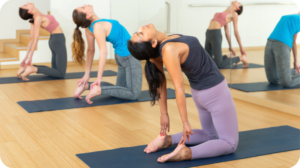Mindfulness is a simple concept in theory, but is a deep, complex, and beneficial whole-life health technique in practice. It is meant to be seamlessly integrated into your everyday routine. Although it may seem overly basic or ephemeral, the real health effects are anything but. Key benefits include:

- Stress reduction
- Anxiety and depression relief
- Pain management
- Sleep aid
Once you become proficient at maintaining mindfulness, you’ll increase your focus on mental tasks, alleviate work burnout, and may even improve your overall health and immune system response.
A Perfect Partner to Meditation
Mindfulness goes hand-in-glove with meditation. Mindfulness is integral to sitting or walking meditation. You need to be aware of thoughts as they arise, and not grab ahold of any one thought that might derail your meditative state. Meditation is one of the best ways to hone your mindfulness skills, and mindfulness can increase your meditation focus—no matter what meditation you choose to do. That’s why mindfulness is usually taught and promoted by a meditation coach or instructor.
A professional can help you achieve regular mindfulness in your everyday life, and overcome roadblocks and distractions to your mindfulness practice. There are several different techniques that you may learn along the way.
- Alert focus. This is simply noticing the world around you in a more vivid way. It can be lingering on the flavor of food, or consciously noticing people and your environment at any given moment during the day. Alertness can be practiced at work, at the gym, on a walk or anywhere at any time.
- Acceptance. Acceptance involves acknowledging both your flaws and good traits with compassion and balance. This is really about learning to accept the good and the bad in life, without excessively latching on to either.
- Breathwork. Mindfulness instructors often preach “coming back to the breath.” That means purposely taking note of different breathing patterns in different situations, and working to improve your breathing. For instance, many people actually hold their breath when stressed. That’s the exact opposite of what your body needs to calm itself.
- The body scan. This can be done during meditation, as a bedtime ritual right before sleep, or to just to be aware of your physical condition and state. You slowly mentally scan from head to toe, purposefully relaxing each area of your body and noticing any problem areas.
You should practice mindfulness at least once a day, but preferably several times a day. After about six months, you’ll likely find yourself defaulting to a mindful state. You’ll become more aware of external stimuli and your reaction to them. At that point, your mindfulness practice can become a useful tool in stopping destructive thoughts and behaviors.
Share some love if you like this post!





